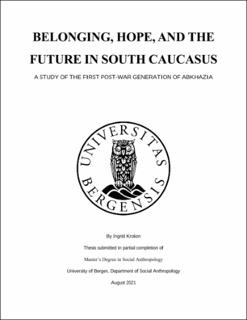Belonging, Hope, and the Future in South Caucasus. A Study of The First Post-War Generation of Abkhazia
Abstract
This thesis is an exploration of how various forms of belonging are being expressed among young adults in Abkhazia, a politically disputed state situated in South Caucasus. Abkhazia is de jure part of Georgia. In 1992, a violent war erupted between Abkhazia and Georgia, following the dissolution of the USSR one year earlier, which led to the population of Abkhazia being reduced to half of the pre-war population. Around 250.000 Georgians were forcefully displaced from Abkhazia, which led to an enormous change in the social and the material landscape of the state. Since then, most of the non-Georgian speaking population of Abkhazia has fought for sovereignty and in 2008, Russia and Nicaragua recognised Abkhazia, changing the political status from unrecognized to partially recognized. Abkhazia’s political status as a de facto state affects many aspects of the populations’ everyday life. Throughout the thesis, I delve into different ways of understanding and expressing a sense of belonging through different elements of ones daily life: the state, documents, traditions and the landscape. With this thesis, I am to fill what I believe is a gap in the anthropological writings from the region. While Georgia has been well studied very little has been written about the population in Abkhazia who do not identify as Georgian or feel any attachment to Georgia and close to nothing can be found about the young generations who grew up during and after the war with Georgia. Through the ethnography I present in this thesis, I hope to give this group of young adults a voice that can contribute to a greater understanding of what it means to be a young in a politically disputed state.
